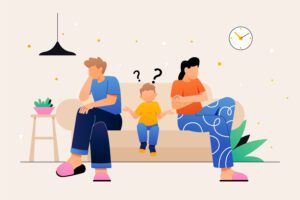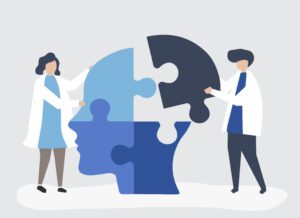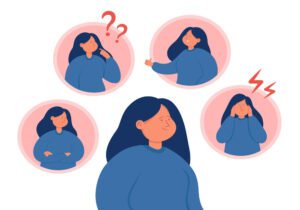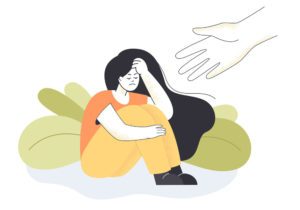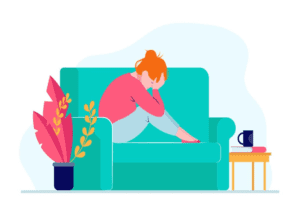How to Talk to Your Therapist When You Have Social Anxiety
This article has been researched and written by Nayla Daou. AI has not been used in producing this article.
Social anxiety disorder (SAD), also called a social phobia, is characterized by intense fear or anxiety of being negatively evaluated, judged, or rejected in a social situation. Individuals with social anxiety often limit their interaction with people outside of their close family and friends. While the degree to which social anxiety impacts an individual varies, it can become persistent, impacting daily life, self-esteem, and happiness. However, like other mental health disorders, social anxiety can be treated with psychotherapy and cognitive behavior therapy.
How Common is Social Anxiety?
While it’s not uncommon for someone with a social anxiety disorder to feel alone and misunderstood, social anxiety is very common. In fact, SAD impacts nearly 7% of the world’s population. While treatable, when left untreated, social anxiety can wreak havoc on those who suffer from it.
Social anxiety can range from mild to severe and can be triggered by many different situations. Common triggers for social anxiety may include:
- Dates
- Job interviews
- Parties and social gatherings
- Public speaking
- Business meetings
While most people experience social anxiety from time to time, this anxiety can become persistent and severe in some cases. Unmanaged social anxiety can make even the smallest social engagements uncomfortable and unpleasant. It can also make it challenging to form meaningful connections and relationships with other people.
Socially anxiety is generally categorized into two categories: non-generalized and generalized. An individual with non-generalized social anxiety does not experience social anxiety all of the time. Instead, specific types of social situations work as a trigger for their anxiety (such as a job interview or a first date). An individual with a generalized social anxiety disorder will avoid most social interactions. These individuals experience an overwhelming fear of negative judgment or rejection, which hinders their ability to engage socially.
Symptoms of Social Anxiety
Social anxiety goes beyond the occasional fear of interacting with others. Individuals with severe social anxiety worry that they will be judged by the people they interact with, and this fear keeps them from living their life to the fullest. Over time, this anxiety can manifest in physical symptoms to include shortness of breath, increased heart rate, faintness, excessive sweating, and shaking.
Individuals with social anxiety may also often experience anxious thoughts, such as “I won’t belong” or “No one will like me.” Many people with social anxiety often want to enjoy socializing with others and want to be included in social activities. However, their anxiety prevents them from doing so. Therapy can help an individual with SAD address the root cause of their social anxiety while providing them with tools and solutions to overcome their anxiety levels.
Social Anxiety and Therapy
It can be hard to open up to a psychologist or therapist when you have social anxiety. After all, therapy is a social experience, which is the very thing that activates social anxiety. Individuals with a social anxiety disorder may initially find it difficult to trust their therapist or open up during their sessions. They may also find it challenging to appear vulnerable for fear of being judged or rejected.
Like with any other relationship, you need to give it time. Although it can be hard to imagine, over time, patients become more comfortable with their therapists. When you find the right therapist, you will begin to trust them enough to open up about your life honestly, and while you may experience social anxiety.
Clearminds
Social anxiety disorder can be a profoundly frustrating and painful condition, but it’s also a treatable one. With the right therapies delivered in a supportive and safe environment, you can develop the inner resources needed to restore functionality, enhance your confidence, and create your life.
Clearminds offers a comprehensive approach for individuals grappling with mental health disorders. Contact a team member to learn more about how our psychology counselling services can help you or your loved one start on the path to lasting wellness.
How to Help Your Child with Anxiety Through Divorce
Divorce is a significant change that affects every member of a family. For children, the uncertainty and adjustments …
Depression vs Sadness: Understanding the Difference
While often used interchangeably, the terms “sadness” and “depression” represent distinct emotional states, each with …
5 Simple Mental Health Practices for Your Everyday Life: Nurturing Your Body & Mind
In today’s fast-paced world, it’s becoming increasingly evident that we need to place our mental health at the forefront
Ways to Reduce Anxiety in 2024
As we say farewell to 2022 and usher in the New Year, we look towards the future. With New Year’s resolutions on the docket, many of us are striving to achieve a calm life …
Navigating Compassion Fatigue in the Digital Age: A Call to Prioritize Mental Well-Being
Amid the constant stream of information and images that flood our screens, the toll on our mental well-being can be …
The Link Between Anxiety and Overeating
All of us have encountered moments of stress and unease throughout our lives. These feelings of anxiety not only bring…
10 Steps To Fix A Toxic Relationship
Every relationship has its fair share of ups and downs, but when toxicity creeps in, it can become a serious challenge. Toxic relationships can be emotionally draining and detrimental to our overall …
Exploring the Benefits of EMDR Therapy for Anxiety and Depression
Anxiety and depression are two of the most common mental health disorders worldwide, affecting millions of people every year. While traditional talk therapy and medication can be …
Health Effects of Untreated Depression
It’s very common to feel sadness at one point or another in our life. Depending on your specific circumstances, you may even feel …
Psychologists vs. Psychiatrists – What’s the Difference?
Clients shouldn’t have to jump through hoops to understand who the perfect candidate is for treating their emotional and/or behavioral struggles. Yet, understanding the type of provider you should see during …

